Bleeding gums when brushing teeth is not an uncommon condition that can be caused by gum inflammation or simply by the bristles being too hard, causing damage to the gums. Therefore, if this condition occurs frequently, it may be a sign of other dangerous oral problems. You need to go to the dentist for timely examination and treatment.
1. Why do you often bleed when brushing your teeth?
Frequent bleeding gums when brushing your teeth can be due to the following causes:
1.1. Gingivitis
Most cases of gingivitis are caused by plaque that has existed on the gum line for a long time. This plaque is actually food debris that has calcified after a long time without being removed from the oral cavity. Dense accumulation of tartar increases the risk of bleeding when brushing because the gums are attacked by bacteria and become more sensitive.
Brushing your teeth regularly, especially after each meal, is the fastest and most effective way to clean plaque and prevent oral diseases.
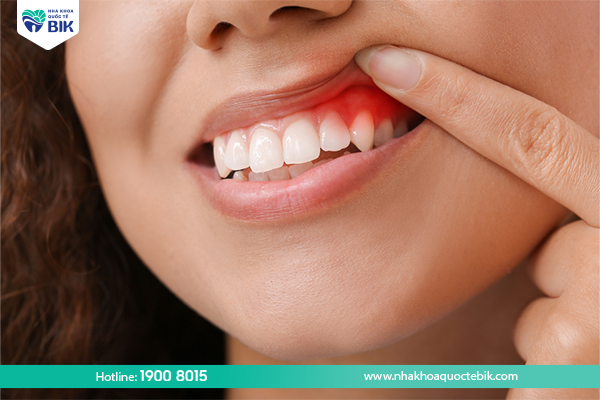
1.2. Periodontitis
Periodontitis is a more severe progression of gingivitis when not treated promptly. At this time, the sensitive gums become infected, the jawbone and supporting tissues connecting the teeth and gums are also attacked and gradually weakened. If left untreated, periodontitis can even cause teeth to loosen and lead to bleeding gums when brushing teeth in the morning.
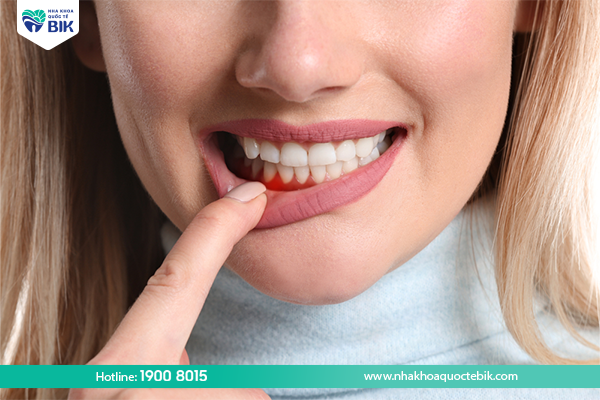
1.3. Tooth abscess
A tooth abscess is an infection in which bacteria invade and attack deep inside the tooth. When you have a tooth abscess, you will feel constant pain, bleeding when brushing your teeth, fever and facial swelling. If it turns into facial swelling, the disease has developed quite seriously.
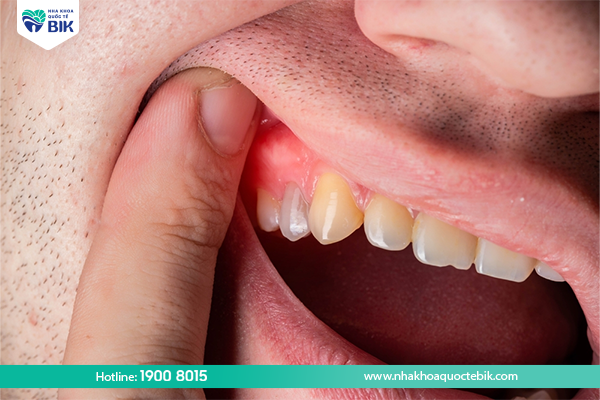
1.4. Due to dental diseases
Some dental diseases that make teeth sensitive and vulnerable can also cause bleeding when brushing. In case of tooth decay, especially cavities in the spaces between teeth, food will accumulate in the cavity causing gingivitis in the spaces between teeth with severe infections, making oral hygiene difficult.
1.5. Hormonal changes
Gums and oral health in general often become more sensitive when the body’s hormones are disrupted, or more simply, the biochemical environment in the body changes erratically. This condition often occurs in pregnant or breastfeeding women when hormones change erratically and can cause bleeding when brushing teeth.
1.6. Poor diet
Some ingredients in the daily diet can irritate the gums and cause frequent bleeding when brushing teeth. Therefore, you need to consider replacing healthier foods that are suitable for your body. The cause of bleeding when brushing teeth can be due to a deficiency of vitamin C or vitamin K.

1.7. Using certain medications
Using medications to treat other diseases can also cause bleeding when brushing teeth. Specifically, some medications to treat chronic diseases such as cardiovascular disease, stroke or chemotherapy drugs to treat cancer can cause bleeding gums.
1.8. Using a hard-bristled toothbrush
In addition, using a hard-bristled toothbrush that is not the right size for your mouth can also cause bleeding when brushing your teeth. Therefore, if you are using a hard toothbrush that makes you feel uncomfortable when brushing your teeth, you should consider switching to a softer toothbrush.
2. Is it dangerous to have bleeding when brushing your teeth?
If your teeth bleed occasionally when brushing, it is completely normal and not a cause for concern. However, if this condition occurs frequently and recurs continuously, it may be a sign of acute inflammatory diseases.
Bleeding when brushing your teeth, if left untreated for a long time without finding out the cause and treating it promptly, can cause serious damage to the gum tissue around the teeth, increasing the risk of gingivitis and even causing tooth loss. If this condition is not treated promptly, it can cause dangerous effects on the following subjects:
– People with cardiovascular disease or diabetes: Increases blood sugar levels and causes some complications such as endocarditis, thereby increasing the risk of myocardial infarction, even stroke.
– Pregnant women: Increases the risk of complications during pregnancy, leading to premature birth or low birth weight.
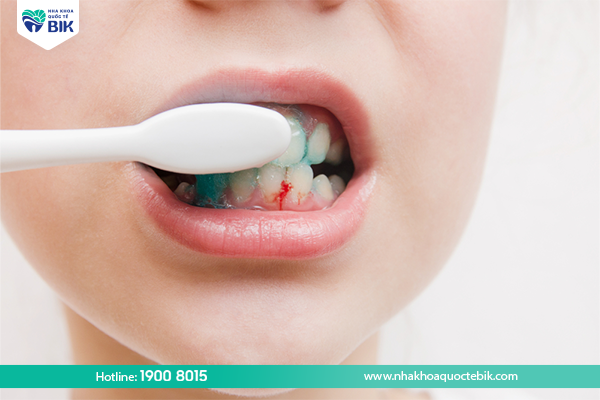
3. How to fix bleeding when brushing your teeth?
To fix bleeding when brushing your teeth, you should note the following:
3.1. Thorough oral hygiene
Brushing your teeth is a must to clean bacteria in the oral cavity to prevent other oral diseases, so even if you bleed when brushing your teeth, you should not skip this step when cleaning your teeth. To limit bleeding, you need to learn about more specialized cleaning methods such as electric toothbrushes with sonic waves, water flossers, etc.

3.2. Scaling
As mentioned above, tartar accumulation around the tooth root is also the cause of bleeding when brushing teeth, so to overcome this condition, scaling is very necessary. You need to go to the dentist to have your teeth scaled using an ultrasonic machine, you should not clean the tartar plaque at home.
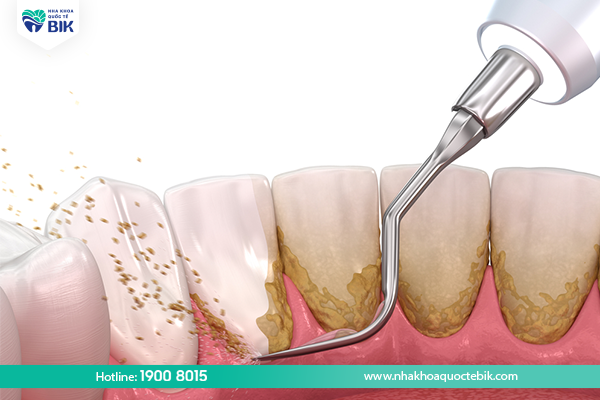
3.3. Treating bleeding gums
When you visit the dentist, you will find out the specific cause of bleeding gums when brushing your teeth and from there the doctor may prescribe some medications to help gradually reduce this condition.
Note that you should not use the drug without a doctor’s instructions because it may not be effective and can also cause serious effects on your overall health.

3.4. Quit bad habits
Some bad habits also cause bleeding when brushing your teeth and make gingivitis worse, such as using toothpicks frequently, brushing your teeth too hard, using dental floss incorrectly, eating a lot of spicy, hot foods, smoking, etc. Therefore, you should improve these habits to improve your oral health.
3.5. Supplement necessary nutrients
Increase vitamin C and vitamin K intake to quickly improve bleeding when brushing your teeth. These substances are abundant in fresh fruits such as oranges, lemons, guavas, radishes, bananas, etc.

4. How to prevent bleeding when brushing teeth?
To prevent bleeding when brushing teeth, you need to limit the possibility of getting inflammatory diseases of the gums and teeth:
– Brush your teeth at least twice a day, especially after each meal to remove food plaque.
– Use a soft-bristled toothbrush with moderate brushing force to avoid damaging the gums.
– Use fluoride toothpaste to support healthy teeth.
– Replace toothpicks with dental floss to remove food debris between teeth.
– Maintain a scientific diet, supplement with necessary vitamins and minerals to support increased resistance to help the body fight harmful bacteria.
– Visit the dentist regularly at least twice a year to ensure regular check-ups on oral health.
So if bleeding occurs over a long period of time and is repeated continuously, it can be a sign of serious inflammatory diseases. At this time, you should go to the dentist to be examined to find the specific cause and then take timely and thorough treatment measures.


















